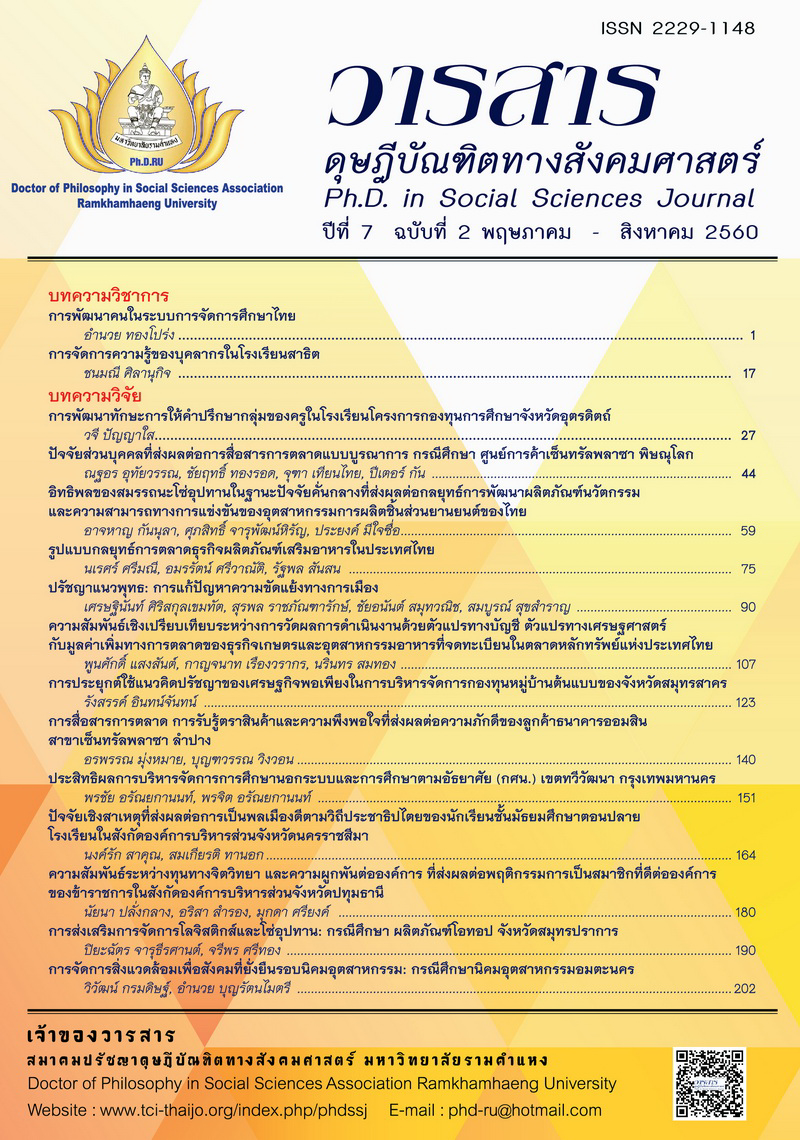ปรัชญาแนวพุทธ: การแก้ปัญหาความขัดแย้งทางการเมือง
Main Article Content
Abstract
การวิจัยครั้งนี้มีวัตถุประสงค์เพื่อศึกษาสภาพปัญหาความขัดแย้งทางการเมืองในสังคมไทย และศึกษาหลักปรัชญาแนวพุทธ กับการแก้ปัญหาความขัดแย้งทางการเมืองรวมถึงการศึกษาเพื่อนำเสนอองค์ความรู้ใหม่ของรูปแบบการแก้ปัญหาความขัดแย้งทางการเมืองตามหลักปรัชญาแนวพุทธ ผู้วิจัยศึกษาสถานการณ์การเปลี่ยนแปลงและความขัดแย้งทางการเมืองไทย โดยลำดับเหตุการณ์ทางการเมืองที่สำคัญ ดังนี้ (1) เหตุการณ์ปฏิวัติสยาม 2475-2500 (2) เหตุการณ์ 14 ตุลาคม 2516 (3) การปฏิวัติรัฐประหาร 19 กันยายน 2549 และ (4) การปฏิวัติ รัฐประหาร 22 พฤษภาคม 2557
ผลการวิจัย พบว่า หลักนิติธรรมซึ่งเป็นเสาหลักสำคัญของการพิทักษ์ ระบอบประชาธิปไตยและการคุ้มครองสิทธิมนุษยชนของประชาชนมีความสอดคล้องกับหลักการและการแก้ปัญหาความขัดแย้งโดยแนวทางวิถีพุทธในสังคมไทย เพื่อแก้ไขปัญหาความขัดแย้งในสังคมการเมือง ที่มุ่งสู่การสร้างสังคมธรรมาธิปไตยขึ้นในประเทศไทยได้ ความขัดแย้งเป็นวิถีแห่งธรรมชาติที่เกิดขึ้นจากปัจจัยภายในซึ่งเป็นแกนกลางที่อยู่ลึกที่สุดในตัวบุคคล ประกอบด้วย อกุศลมูล คือ โลภะ โทสะ โมหะ และเมื่อเหตุของปัจจัยภายใน รวมกับปัจจัยภายนอก ได้แก่ ทิฐิมานะแล้วกลายเป็นแรงผลักดันให้เกิดสภาวะของความขัดแย้งขึ้น และนำไปสู่ความรุนแรงในที่สุด และพบว่า หลังจากการเปลี่ยนแปลงการปกครองมาจนถึงปัจจุบัน สาเหตุของความขัดแย้งทางการเมืองนั้นเกิดจากกิเลส ได้แก่ ความโลภ ความโกรธ ความหลง อำนาจ และการแสวงหาอำนาจ ที่ผูกพันกับผลประโยชน์ นอกจากนี้ ยังสะท้อนให้เห็นถึงค่านิยม ความเชื่อที่เปลี่ยนแปลงไปของภาคประชาสังคม ที่เข้ามามีส่วนร่วมทางการเมืองมากที่สุด ในช่วงเวลาที่เกิดความขัดแย้งมากที่สุด ส่วนการแก้ปัญหาทางการเมืองแบบเดิมที่วนเวียนอยู่ในวัฎจักร ของการปฏิวัติ รัฐประหาร-ร่างรัฐธรรมนูญ-เลือกตั้ง-รัฐประหาร นั้นเป็นเพียงการแก้ปัญหาความขัดแย้งได้ชั่วคราวเท่านั้น
BUDDHIST PHILOSOPHY APPROACH TO POLITICAL CONFLICT RESOLUTION
The goals of this research inquiry were twofold: To study political conflict in Thai society and to determine how Buddhist philosophy could be used in solving the problem of political conflict in this society. In order to solve these problems, however, it was necessary to apply the results of a modernized version of Buddhist Philosophy. In carrying out this investigation, the researcher analyzed significant periods of change in the modern history of the Kingdom of Siam (Siam) and its successor, the Kingdom of Thailand (Thailand). In the immediate wake of these changes came episodes of political conflict, episodes carefully scrutinized by the researcher. Thus, the researcher examined the following episodes: (1) The Siamese-Thai Revolution of B. E. 2475-2500 B.E (1932-1957) (2) The October 14th Event, B. E. 2516 B.E (1973) (3) The Coup d’état of September 19, B.E. 2549 (2006) and (4) The Coup d’état of May 22, B. E. 2557 (2014)
It was found that the mainstream democratic notion of the rule of law as protective of human rights is comparable in some important respects to Buddhist principles of problem solving in Thai society. The former idea can prove useful in solving problems in political society and in encouraging the development of a meritocratic society in Thailand. Conflict is naturally initiated by internal factors lying at the deepest core of individual human beings. These evil internal factors include greed, anger, and delusion. When these internal factors become engaged with certain untoward external factors the individual becomes recalcitrant. The combination of these internal and external factors causally precipitates conflict, conflict often ending in overt acts of physical violence. In studying the aforementioned periods of change in modern Thai history up to the present time, the factors of greed, anger, delusion coupled with deception, authoritarianism, and the lust for filthy lucre in the taking of profits are, collectively, the cause of political conflict. In addition, most saliently, political change is reflective of changes in the system of values held by members of civil society, a state of affairs which must also be taken into account. Problems of political conflict continually involve sequential revolutionary scenarios reaching only temporary quiescence. Thus, we have seen the same cycle reoccurring in which a coup d’état is following by a draft constitution which in turn is followed by an election and then by another coup d’état. It is patently the case that resolutions are only temporary in nature.
Article Details
Academic articles, research articles, and book reviews in the Ph.D. in Social Sciences Journal are author’s opinions, and not the publisher’s, and is not the responsibility of the Ph.D. in Social Sciences Journal Philosophy Association, Ramkhamhaeng University. (In the case that research is done on human, the researcher has to be trained in Ethics for Doing Research on Human Training and has to produce the evidence of the training).


